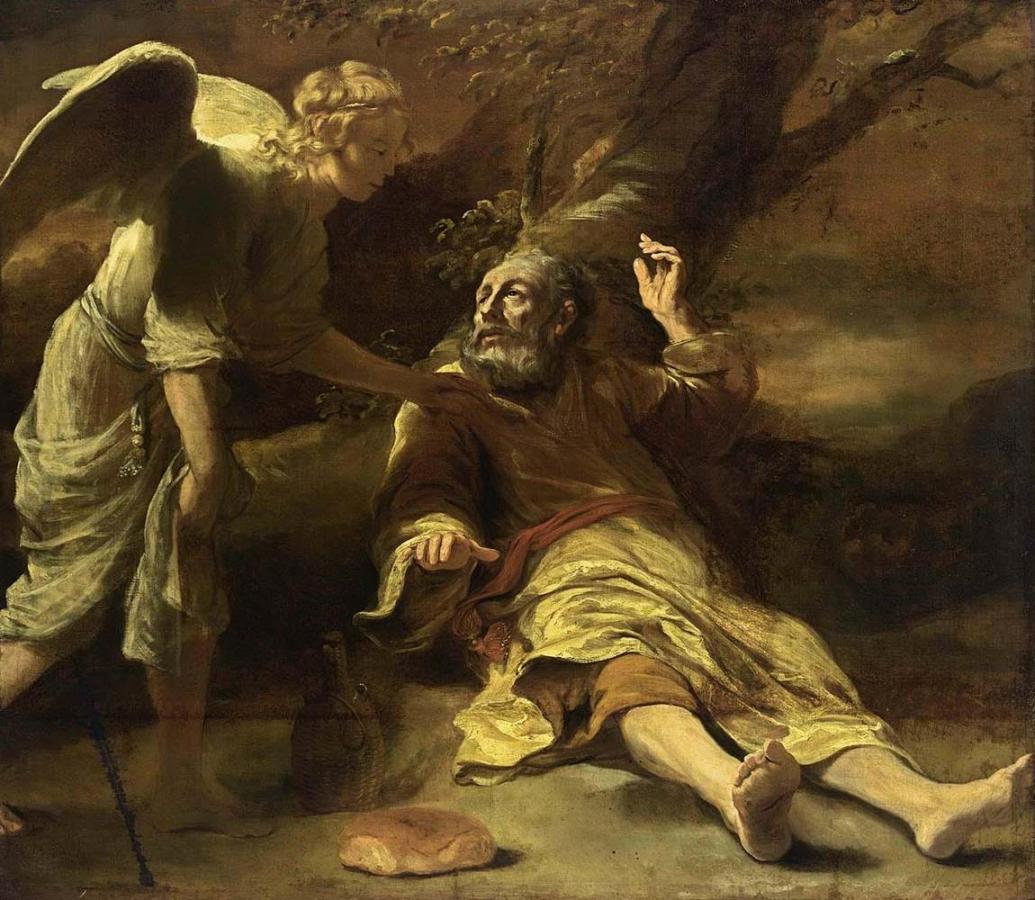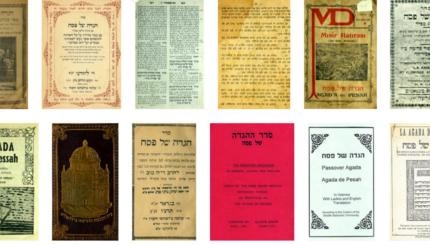Elijah the Tishbite, from the region of Gilead, was one of the two men in the Hebrew Scriptures who did not die but was taken by God; the other was Enoch (Genesis 5:24).
Under King Ahab
Elijah prophesied during the reign of King Ahab of Israel. He performed his first miracles in the town of Zarephath, near Sidon, in the house of a poor widow, where he converted a handful of meal and a little oil into an endless supply and brought back to life the dead child of the widow.
Jezebel, the wife of King Ahab, was a Phoenician princess, daughter of Ethbaal, king of Sidon. She exerted a strong influence over the king, who granted her unlimited administrative authority. She introduced in Israel the Phoenician pagan cult of the god Baal, a development that was bitterly opposed by the prophet Elijah. Not only did Ahab tolerate the foreign cult introduced by his wife but he also cooperated with her by building a temple for Baal in Samaria and erecting a sacred post.
Elijah told the king that God would withhold rain to punish him and left the country. There was a severe food shortage in Samaria, which lasted three years. In the third year of the famine, King Ahab talked with Obadiah, the governor of the royal palace, and said that they should both travel through the land–the king in one direction, and the palace governor in another–searching for places where there was enough grass to feed the horses and the mules.

Help us keep Jewish knowledge accessible to millions of people around the world.
Your donation to My Jewish Learning fuels endless journeys of Jewish discovery. With your help, My Jewish Learning can continue to provide nonstop opportunities for learning, connection and growth.
Obadiah was a God-fearing man, who had risked his life by protecting 100 prophets of the Lord from Jezebel’s murderous persecution and hiding them in a cave. He met Elijah on the road and was told by the prophet to tell the king that he was back in Israel. Obadiah, although afraid that Ahab would kill him for bringing news of Elijah, informed the king that the prophet had returned to the kingdom. Ahab went to meet Elijah. When he saw him, he accused the prophet of being a troublemaker.
Elijah retorted that Ahab and his father, Omri, were the real troublemakers, because they had forsaken the true God and worshiped the idols of Baal. Elijah requested an encounter with the prophets of Baal, who were under Queen Jezebel’s protection and who ate at her table. King Ahab consented. Elijah confronted 450 priests of Baal at Mount Carmel and challenged them to prove who was the true God, the Lord or Baal, by having fire from heaven come down and consume the sacrifice.
The priests of Baal prayed for hours without any results, while Elijah mocked them. Then it was Elijah’s turn to pray to God. Fire came down on the altar and consumed the sacrifice. Elijah told the people to seize and kill the priests of Baal.
The drought, which had lasted three years, broke in a great storm. Ahab drove back to his capital in his chariot through the heavy rain, with the prophet Elijah running in front of the king all the way to Jezreel. Ahab told Jezebel that Elijah had killed her prophets. The queen was furious and sent a messenger to Elijah, threatening to kill him.
The Story of Naboth
The prophet escaped to the desert in the south. There, he found Elisha son of Shaphat, who was plowing with oxen when Elijah placed his cloak upon him, thus symbolizing that he had chosen Elisha as a disciple. Elisha slaughtered two oxen, used the plow for firewood, gave the meat to his people, and left to follow Elijah.
Ahab coveted the vineyard of his neighbor Naboth the Jezreelite. The king’s intention was to use that plot of land, which was adjacent to the palace, for a vegetable garden. He offered to pay Naboth for the land or to exchange it for an equivalent plot. Naboth refused to give up his family inheritance, and the king went back to the palace depressed and angry.
His wife, Jezebel, asked him why was he so depressed and why he refused to eat. The king replied that Naboth wouldn’t sell him his land. Jezebel told him to be cheerful and to leave the matters in her hands. Jezebel arranged to have Naboth accused falsely of insulting God. Naboth was tried for blasphemy and was executed. Ahab then took possession of the property.
The Prophet Elijah went to Naboth’s vineyard, confronted the king, and accused him of murdering the man and taking over his property. The prophet told the king that God would punish him for his evil deeds; that dogs would lick his blood in the very place that dogs had licked up Naboth’s blood; that his family would come to the same bad end as King Jeroboam and King Baasha; and that dogs would eat the body of his wife, Jezebel.
After Elijah finished speaking, Ahab tore his clothes, took them off, and put on sackcloth. He fasted, slept in the sackcloth, and walked about gloomy and depressed. The king’s humble behavior made God relent and postpone the prophesied disaster until the reign of Ahab’s son, after Ahab’s death. Ahab died fighting against the Arameans, and his son Ahaziah succeeded to the throne.
Elijah is Protected by God
Shortly afterward, the new king severely injured himself when he fell from the window of an upper story of his palace. Ahaziah sent messengers to the Philistine city of Ekron to ask Baal-zebub, the god of that city, whether he would recover. Elijah reproved him for this act and prophesied that he would die. The king heard what Elijah had prophesied and sent a company of 50 soldiers to seize the prophet, but the troops were killed by fire from heaven.
The same thing happened to a second company of soldiers. A third company of soldiers was sent, which, this time, succeeded in bringing Elijah to the palace. Elijah, once in the presence of the king, repeated his prophecy. The king died soon afterward. Elijah knew that his own end was near.
With his disciple Elisha, who refused to leave him, he went to the river Jordan, divided the waters by hitting them with his mantle, and crossed over on dry ground. Elijah asked Elisha, “Tell me, what can I do for you before I am taken from you?”
Elisha answered, “Let a double portion of your spirit pass on to me (2 Kings 2:9).” While they were talking, a chariot pulled by horses of fire appeared and took Elijah by a whirlwind into heaven.
Reprinted with permission from Who’s Who in the Hebrew Bible (The Jewish Publication Society).
Moshe
Pronounced: moe-SHEH, Origin: Hebrew, Moses, whom God chooses to lead the Jews out of Egypt.

Help us keep Jewish knowledge accessible to millions of people around the world.
Your donation to My Jewish Learning fuels endless journeys of Jewish discovery. With your help, My Jewish Learning can continue to provide nonstop opportunities for learning, connection and growth.



